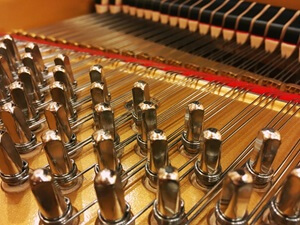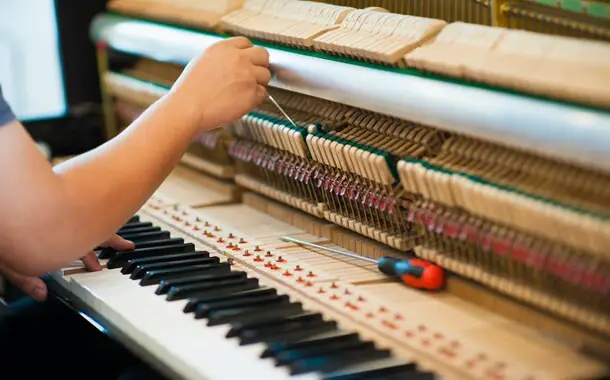How Much Does it Cost to Tune a Piano?
Last Updated on February 5, 2024
Written by CPA Alec Pow | Content Reviewed by ![]() CFA Alexander Popinker
CFA Alexander Popinker
If you own a piano, regular tuning and maintenance is essential for keeping your instrument in top playing condition. But how much should you expect to budget for piano tuning services? Read on to learn about the typical costs, factors that affect pricing, and tips for finding the right technician.
How Much Does it Cost to Tune a Piano?
On average, piano tuning costs range from $80 to $225. The final price depends on several variables, including your piano type, condition, location, and the experience level of the technician. While a basic tuning for an upright piano may start around $80, a high-end grand piano tuning could cost $200 or more.
According to Bankrate.com, for example, the average price to tune a piano ranges from $65 to $225, and the cost can increase by several hundred dollars if the piano requires multiple tuning sessions.
Thumbtack.com notes that the national average cost for piano tuning ranges between $100 and $120, although pricing can be higher or lower depending on your piano and other variables.
Amplify.com writes that typically, most piano tuners charge by the hour, but $100 to $200 every 6-12 months is much cheaper than having the piano restrung.
A Reddit discussion showed that most established piano tuners seem to charge in the $120-200 range for a basic tuning.
What is Piano Tuning?
Before diving into piano tuning prices, let’s review the basics of what piano tuning entails.
Piano tuning is the process of adjusting the tension and pitch of the strings so that each key produces the proper note. Over time, factors like changing humidity, stretching of the wires, and normal wear will cause a piano to go out of tune. Hiring a professional piano technician to perform maintenance helps keep your instrument sounding its best.
During a standard tuning, the technician will:
- Assess the overall condition and make necessary repairs or adjustments
- Tighten or loosen the wires to achieve the correct pitch and tone for each key
- Fine-tune and voice the notes to create consistent sound quality across the keyboard
- Test and double-check pitch accuracy when finished
Factors That Influence Piano Tuning Cost
Several variables impact the cost of tuning your piano:
Piano Type
Larger grand pianos generally cost more to tune than smaller upright pianos because of their size, exposed strings, and precision required. For example, tuning a studio upright might start around $100, while a concert grand could be $300 or more.
Piano Condition
Poorly maintained pianos or those that haven’t been tuned in years will require more work. If significant repairs are needed before tuning can be completed, costs will increase.
Technician Experience
More experienced technicians may charge higher rates for their expertise, especially if they specialize in performance instruments. However, they can tune more efficiently.
Travel Fees
Expect to pay extra for on-site tuning at your home versus the technician’s shop. Travel time and transportation costs are usually factored into the service call fee.
Pitch Adjustment
Correcting serious pitch issues or completing special pitch adjustments like historical temperaments may add $50 or more to the tuning price.
Additional Locale
Metro regions with higher costs of living will command higher piano tuning rates overall compared to rural areas.
The Importance of Regular Piano Maintenance
Tuning your piano once a year is recommended at a minimum for most instruments. However, tuning twice a year is better for pianos played often or used for performances.
 More frequent tuning and service have several benefits:
More frequent tuning and service have several benefits:
- Preserves sound quality and touch response – Regular maintenance keeps all components like strings, hammers, and keys working optimally.
- Extends piano life – Proper upkeep reduces wear and prevents costly repairs down the road.
- Maintains resale value – Well-maintained pianos hold their value and sell faster when the time comes.
- Enhances playability – Keeping your piano in tune allows for accurate learning, practicing, and performing.
- Improves tone – With precise tuning and voicing, notes ring out with clarity and warmth.
Don’t defer routine maintenance to save money. In the long run, a lack of tuning accelerates the deterioration and necessitates more extensive repairs.
You might also like our articles about the cost of a pipe organ, harp, or tuba.
Choosing a Piano Tuner
When hiring a piano tuner, look for these qualifications and expertise:
- Reputable references – Check reviews and ask for referrals from fellow musicians or piano teachers.
- Proper credentials – Look for technicians accredited by the Piano Technicians Guild for quality assurance.
- Specialization – Those focused on tuning performance instruments may provide superior service.
- Experience – Ask about years in business, training, education, and past clients.
- Communication – Choose someone who listens, answers all questions, and keeps you informed.
- Availability – Look for a technician who can accommodate your schedule for service calls.
Don’t just default to the cheapest option. Quality tuning makes a considerable difference in your piano’s sound and playability.
Additional Costs to Consider
Beyond the basic tuning fee, here are some other potential services or repairs to factor into your budget:
- Pitch raise: $100 to $300+
- Full regulation and voicing: $150 to $500+
- Repair of broken strings: $100 per string
- Replacement of worn hammers or parts: $150 to $500+
- Movers for grand pianos: $100 to $300
Ask your technician for an estimate of any issues they notice ahead of time so you can approve repairs and understand added costs. Be wary of any technicians who seem to always find mysterious problems requiring expensive fixes. Get a second opinion if in doubt.
Final Words
While the initial investment may seem high, proper piano maintenance through regular tuning and service pays off in the long run by preserving your instrument’s function and value.
For most pianos, plan on budgeting $100 to $150 annually for one or two professional tunings. Additional repairs or extensive restoration work can vary widely in price. With a quality, experienced technician, you can keep your piano sounding its absolute best for years to come.
Frequently Asked Questions
Can a piano be tuned after 20 years?
Yes, a piano can still be tuned even after not being maintained for 20 years. However, the longer a piano goes without tuning, the more out of tune it will become. After such a long period, the piano will likely need extensive work beyond just a basic tuning.
The strings and other components deteriorate over time without tension adjustments. In addition to tuning each note, the technician may need to do pitch raises, voicing, regulation, and other repairs to restore playability.
Expect higher costs for getting a piano back into shape after decades of neglect. But with a skilled technician, even a 20-year untuned piano can be revived.
Can I tune a piano myself?
It is not recommended for most piano owners to tune their own instruments. Piano tuning is a complex skill that requires specialized tools, technical knowledge, and extensive training to perform correctly.
While you can purchase electronic tuners and learn the basics from instructional books or videos, achieving accurate, high-quality tuning is extremely difficult for amateurs.
Mistakes made by inexperienced individuals trying to self-tune a piano can cause serious damage or make tuning issues worse. For long-term care and best results, hire an accredited professional piano technician.
Should I buy a piano that hasn’t been tuned in 10 years?
Buying an untuned piano that hasn’t had maintenance in 10 years presents a gamble. On a limited budget, it may be tempting to purchase a well-priced piano in need of attention.
However, be prepared to invest several hundred dollars or more on tuning, repairs, replacements, and restoration work to get such an instrument back into proper playing condition.
Evaluate the piano’s brand, condition, repair history, and overall potential before purchasing. Only proceed if you can accept the cost and effort of reconditioning that will be required after decades of neglect. Seek input from your piano tuner on whether an untuned piano is worth purchasing.


Leave a Reply
Want to join the discussion?Feel free to contribute!